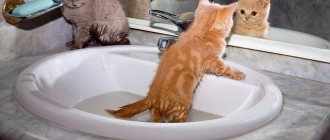What will you learn from the article?
- How to determine if you are ready to buy a kitten
- How to choose a kitten What to look for when buying a kitten
- How to choose the right healthy kitten
- Pet shop and pet market
- Pros of buying a kitten
Take your decision to buy a kitten seriously. This is a new family member for whom you are now responsible. To ensure that your pet does not disappoint, brings only joy to your home, and lives a long and happy life next to you, approach your choice responsibly.
In this article we will cover:
- How to choose a kitten.
- Where is the best place to buy kittens?
- What to check before purchasing.
- Which kittens are best to take into a house or a city apartment?
How to determine if you are ready to buy a kitten
Before making a purchase, answer these questions:
- Does everyone in the family want to have a cat? Talk to your household, warn them of your intention, listen to possible concerns and wishes. Having a pet is a responsibility. Its maintenance will require the participation of all family members. It is important that everyone is willing to accept and care for the animal.
- Are your family members allergic to cats? It is important to clarify this before an animal appears in the house.
- If you have other pets, will they be able to accept a new pet? Some dogs perceive small kittens as prey. The baby himself, with his irrepressible energy and curiosity, can irritate sedate adult cats. And it is dangerous to leave rodents and birds alone with a kitten.
- Do you have enough money for maintenance? It is important to analyze your budget to see if it is enough to support a new pet. Consider the cat's lifespan; the budget should be enough for the long term.
- Do you have enough time to devote to your kitten? Evaluate your schedule. Analyze whether your family has the opportunity not to leave the baby alone for a long time. Kittens need to be fed regularly, their tray changed, and played with.
- Will your children be able to get along with their new pet? To ensure a successful life together for your little family members and your animal, choose a pet from the best cat breeds for children.
How to choose a kitten
Buying a kitten is not just about choosing the cutest baby.
You must decide on the breed and gender you want. The animal must suit your temperament, be healthy, socialized, and have basic skills (eat on its own, go to the litter box).
If you choose a purebred pet, it is important that he and his parents have all the supporting documents and the results of tests for hereditary diseases.
- Do not buy based on the photo based on the seller's characteristics.
- Get to know the candidates for purchase in advance, see in what conditions they are kept.
- Look at the parents and other babies from the litter, compare them.
- Do not hesitate to ask the seller, demand documents for the kitten and parents’ passports, and the results of genetic tests.
- Check the physical and mental health of the chosen animal before purchasing.
- Personally evaluate the conditions of detention and care.
Remember, you are choosing a pet for yourself not for one day, but for the next 15-20 years.
Video
What to look for when buying a kitten
In order not to make a mistake in choosing a new pet, do not rush to take the baby home as soon as you see him, even if you really liked him. Visit him at least twice to observe him, his mother, and siblings.
You need to make sure that the kitten and its littermates are happy and well cared for. If the animals look unhappy or tortured, or you are not allowed to see the baby in his usual environment, refuse the purchase.
What else to pay attention to:
- Meet the baby's mother. She should look relaxed, happy, not afraid of people, and feel comfortable in their presence. The influence of the mother is of great importance in shaping the character of the kitten.
- Assess the conditions of detention. Inspect the room where the cat and her children live. It should be clean, warm, without any unpleasant odors. The presence of cells, dirt, and strong odors should alert you. Ask the seller to show you the bowls and litter box the animals use. They must be clean. This indicates good care of the animals.
- Find out from the breeder the age of the animal, evaluate whether the appearance of the kitten corresponds to this age. You cannot take an animal younger than 2-3 months.
- Check the gender of the kitten. You must make sure that the baby belongs to the gender that you want to have.
- Ask to see the kitten's documents, documents of its mother and father. You must make sure that the kitten belongs to the cat breed that the seller told you.
- Ask if the kitten has been checked by a veterinarian, if it has any vaccinations, has been treated for parasites, or has genetic testing done. A conscientious breeder will show you a veterinary passport, which reflects all this information. At the age of 2-3 months the first vaccination should be given.
- Ask to see the mother's veterinary passport; it should also contain information about vaccinations, anti-parasitic treatment and genetic test results.
- Ask about diet. Find out what the seller fed you. Let the owner show the food he fed the mother and offspring and talk about the complementary foods introduced. Consider whether you can feed this food, find out about alternative brands.
- Ask if the cat is accustomed to the tray and scratching post. Visit the seller several times to see for yourself.
- Check socialization. Take the kitten in your arms and play with it a little. He should not be afraid, hiss, try to escape from his hands, or bend in an “arc.” This behavior is not typical of healthy, socially adapted kittens.
- Ask the seller if the kitten has a nickname, try calling him by name. Smart kids at this age already respond to their name. If the breeder did not give a nickname, you can choose your own from our list of nicknames.
- Examine the animal and assess its health. Read on to find out how to do this.
How to choose the right healthy kitten
A healthy kitten is a guarantee that it will cause you fewer problems. Responsible sellers will not hide from you whether the baby has health problems of a genetic or non-hereditary nature.
You should be able to examine the kitten before purchasing and take it to the vet if you have any doubts about its health. This will help resolve issues with the seller if any health problems are discovered in the candidate for purchase.
How to check your kitten's health
- Examine the animal's eyes. The view must be clear. Eyes are clear, without cloudiness, redness, discharge or tears.
- Look inside the cat's ears. They should be clean, without black crusts, redness, or dirty sulfur. There should be no unpleasant odor from the ears. Dirty ears indicate illness and poor care.
- Look at the nose. It should be clean, without ulcers or discharge.
- The kitten's coat should be clean, free of dandruff, traces of parasites, not matted, smooth and shiny. It should not have an unpleasant odor.
- Look under the tail. It should be clean, there should be no signs of diarrhea or worms.
- Listen to your breathing. There should be no characteristic “whistle”.
- The kitten should not sneeze constantly - this is a sign of illness.
- Examine the skin. There should be no wounds, ulcers or dried crusts on the body.
- Estimate the weight. The kitten should not be skinny or overly plump. An overly swollen belly may indicate the presence of worms.
- Look into your mouth. There should be no unpleasant odor coming from the mouth. The number of teeth should correspond to the age of the animal. They must be clean.
- Healthy kittens are cheerful and playful, without apathy, aggression or depression.
Small scratches on the neck should not bother you - these are marks from the mother's teeth.
Video
Unusual cat breeds
For you, is a cat not only a pet, but also a way of self-expression? Take a closer look at unusual cat breeds. This is where you should choose to suit your taste!
Cats with original appearance
There are people who want to be unique even in choosing a pet. If you want your friends to admire your cat, take a closer look at these breeds:
American Curl
Curly curled ears
Devon Rex
A cat with the appearance of an alien
Cornish Rex
Curly fur and graceful posture
Laperm
Pet with large curls
Munchkin
Cute cat with short legs
Peterbald
An elegant cat with smooth skin.
Cats with an unusual appearance will also delight you with a wonderful character. Some of these breeds are not cheap - but you can overpay for such pleasure!
Resembling wild cats
Some people want to bring something exotic into their normal lives: bring home a real leopard! However, a leopard is a dangerous undertaking. Then choose a domestic cat breed in a wild shell:
Bengal cat
Domestic inquisitive leopard
Bombay cat
Black panther with a homely disposition
Ocicat
A mischievous fidget with the appearance of a wild cat
Savannah
An African animal for your home
With such cats you feel like you are in the jungle: their unusual appearance contributes to this. All breeds, except the Bombay, truly have wild roots.
Where is the best place to buy a kitten?
There are several ways to purchase a kitten:
- pet Shop,
- pet market,
- from a registered breeder,
- in the nursery,
- at a cat show,
- "buy second hand."
Pet shop and pet market
Pros of purchasing:
- Wide variety of breeds.
- Relatively low cost.
Disadvantages of the purchase:
- It is always better to observe the kitten before purchasing in the place where it was born and lived the first months of its life in the company of its mother. This provides information about the animal's health and temperament. Pet stores and pet markets do not provide this opportunity.
- Kittens of different litters can be kept in the same cage. This increases their vulnerability to infections.
- Not all stores and markets strictly adhere to sanitary standards. Keeping animals in unsanitary conditions undermines the health of animals.
- The kittens spend the whole day in cages, with many people passing by. At night they are left alone in the dark. This causes severe stress in the animals.
- Store and market sellers do not always vaccinate their animals or carry out antiparasitic treatment. They also do not always have information about the parents and documents confirming the breed.
- A kitten can live in a store for several months before being sold, this complicates its adaptation to a new family.
Buying “from hand”, according to an advertisement
Pros of purchasing:
- Low price.
- The ability to assess the conditions of detention once in the seller’s house.
Disadvantages of the purchase:
- There is a high probability of buying a mongrel kitten under the guise of a purebred one.
- Inability to confirm the breed with documents.
- It is impossible to determine the exact origin of the kitten.
Registered breeder, nursery
The best way to buy a purebred kitten is to go to a pedigree nursery or registered breeder. Conscientious breeders are responsible for the kittens they sell.
They are obliged to provide the buyer with the most detailed and reliable information and answer all questions. In addition, breeders must provide information support to the buyer during the first time after purchasing a kitten.
Pros of purchasing:
- True pedigree.
- Opportunity to meet parents and their documents.
- Healthier kittens.
Disadvantages of the purchase:
- High cost, justified by the above advantages.
How to check a breeder
A registered breeder is the best place to buy a purebred cat. But, you need to remember that there are both good and bad breeders. It is important to be able to distinguish one from the other. Next, we will tell you how to check the integrity of a cat breeder.
Conscientious breeder:
- Provides all comprehensive information about the object of sale and its parents in the ad. Posts a lot of photos of the litter.
- He doesn’t hide anything, doesn’t shy away from questions about the breed and specific animals. Knows the distinctive features of the breed, what birth defects it has.
- Encourages the buyer to meet the kittens several times before purchasing.
- Keeps the cat and its offspring clean and warm at home. Provides comfortable maintenance and proper care.
- Feeds animals with high-quality balanced nutrition. Doesn't skimp on the animals' diet.
- Insists on meeting the kitten's parents, gives all the information about the father and mother, and provides documents for them.
- Does not give away kittens until they reach 2-3 months of age.
- Vaccines kittens before transfer to a new home, carries out antiparasitic treatment, examines them at the veterinarian, and conducts genetic tests. Makes a veterinary passport with all the marks.
- Provides early socialization of kittens and tells buyers how this was done (adaptation to loud noises, meeting strangers and other pets).
- Registers kittens in breed clubs. Issues supporting documents to the buyer.
- Reputable breeders participate in cat shows and can confirm their participation with documents.
- Does not increase the price more than once a year.
- Provide information support to the buyer after the sale.
Unscrupulous breeder:
- Sells kittens that are under 2 months old.
- Does not have clear answers to questions about the breed being sold. Avoids them.
- Gets confused when answering questions about genetic breed defects and avoids answering.
- Breeds too many breeds and contains a large number of individuals in a limited space (overpopulation).
- He talks little about the kitten's character and boasts a lot about his titles.
- He speaks negatively about other breeders and does not recommend buying from competitors.
- Increases the cost due to the unusual color and non-standard size of the animal.
- He is not interested in where you are taking the kitten, or in what conditions you are going to keep it.
- After the sale, he does not maintain contact with the buyer, is not interested in the life of the kitten, and does not provide information support to the new owner.
- Frequent price changes and lack of price list are a sign of fraud.
- Doesn't register kittens, claims it's not necessary.
- Does not vaccinate kittens or carry out antiparasitic treatment.
Which is better: an adult cat or a kitten?
To decide who is better to adopt: a kitten or an adult animal, you need to evaluate many factors. In this case, issues of the animal’s appearance, its gender, and breed fade into the background. It is important to take into account your temperament, age, marital status, presence of children, lifestyle, living conditions.
Yes, kittens are chosen more often, but only because they are charming, cute, and playful. Who doesn’t want to have such a “living toy”. But adult cats also have a lot of advantages. And given that many of them live to be 18-20 years old, you should not immediately refuse to adopt an adult cat. They will have time to give you their love and affection.
Small kittens need more care and attention. The first time must be spent on socializing the pets, accustoming them to life in a new place, teaching them to go to the litter box and use a scratching post. They require a lot of veterinary care during the first year of life. The owners will be required to create a safe, comfortable space for active, inquisitive children to live.
Adult cats, as a rule, no longer need to be taught to go to the toilet or use a scratching post. They do not need to be fed as often as small kittens. You can get love, affection and companionship from adult cats with much less effort. They are usually calmer and less active than restless kittens.
Pros of buying a kitten
- You will be able to live together longer.
- They have fewer behavioral problems due to previous negative experiences.
- You have the opportunity to obtain more accurate information about your health and ancestry.
Disadvantages of buying a kitten
- More thorough medical attention and care is needed.
- Kittens need to be given more time and attention.
- They need to be fed more often.
Who are kittens suitable for?
- Families in which someone is always at home.
- Families with older children.
- Young active families.
Who is better to adopt an adult cat?
- Families with small children.
- Single working people and families where people are away from home most of the day.
- To old people.
What gender is the little pet?
The first point, which is predetermining for many people, is the gender of the kitten. Females and males differ from each other from early childhood not only in external sexual characteristics. As a rule, the individual behavioral characteristics of pets largely depend on gender. They say that cats are more inclined to loyal friendship with their owner than naughty cats, which, in turn, are famous for their capricious and changeable disposition. Perhaps this is just a stereotype. How an animal will behave at home largely depends on the upbringing it received from the first months of life.
Before choosing a kitten from the litter, you can independently determine whether it is a boy or a girl. In one-month-old babies, external sexual characteristics are not clearly expressed, so the characteristic feature by which one can navigate is the distance between the anus and the urinary tract. In cats it is insignificant; in small cats it reaches 2 cm.











